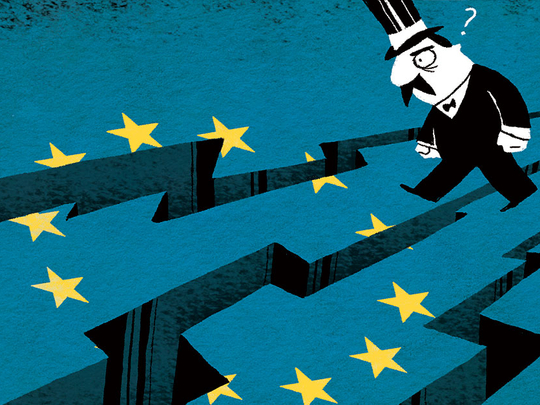
There are three crises afflicting Europe. Two are on the borders of the European Union (EU): A warlike Russia and an imploding Middle East. The third emergency is taking place inside the EU itself — where political, economic and diplomatic tensions are mounting.
The past month has seen all three crises facing Europe intensify. The terrorist attacks in Paris heightened fears about the potential spillover of violence and religious tensions from the Middle East. Russian-backed separatists have renewed their offensive in Ukraine. And Syriza’s victory in Greece means that — for the first time since the euro crisis broke out — a radical Left party has won an election in a EU country. The problems in Russia, the Middle East and the Eurozone have very different roots. But, as they worsen, they are beginning to feed on each other.
The economic slump in much of the EU has encouraged the rise of populist parties of the Right and Left. The sense of insecurity on which the populists feed has been further encouraged by the spillover from the conflict in the Middle East — whether in the form of terrorism or mass illegal migration. In countries such as Greece and Italy, the inflow of migrants from (or through) the Middle East has heightened the atmosphere of social crisis, making immigration almost as controversial as austerity.
Meanwhile, Russia’s military intervention in Ukraine presents the EU with its biggest foreign policy challenge since the Cold War. Mishandled, it could lead to a military conflict. The EU, marshalled by Germany, has managed to unite around a reasonably tough package of sanctions. But the rise of the political extremes within Europe threatens EU unity on Russia — making it more likely that the Kremlin will be emboldened and that the crisis will escalate.
One emotion that seems to unite the far-Left and the far-Right in countries such as Greece, Germany and France is a soft spot for President Vladimir Putin’s Russia. The far-Right likes Putin’s social conservatism, his emphasis on the nation state, his authoritarianism and his hostility to America and the EU. The extreme Left seems to have retained its traditional affinity for Moscow.
It makes perfect sense for Russia to cultivate the political extremes inside the EU. If the unity of the EU breaks down, the sanctions regime that has helped isolate Russia will also begin to dissolve. Putin has fostered ties with the far-Right National Front in France, as well as Syriza in Greece. The first foreign dignitary received by Alexis Tsipras, the new Greek Prime Minister, was the Russian ambassador. His government immediately voiced its opposition to further EU sanctions on Russia.
For Angela Merkel, the German Chancellor and Europe’s dominant political figure, the problems are crowding in. She is under domestic pressure to be tough with Greece — but under international pressure to cut a deal. Greece’s flirtation with Russia has added a geopolitical angle to the euro crisis, making it likely that the Americans will press Germany to keep the Greeks within the EU family. (Historians may recall that the Truman doctrine of containment of the Soviet Union was rolled out in 1947, as Washington moved to keep Greece from falling into Moscow’s orbit.)
The intensification of the fighting in Ukraine presents the German chancellor with another set of stark choices. The clamour to arm the Ukrainians is growing in the US and parts of the EU. But the Russians are issuing dire warnings about the consequences of such a decision that are likely to alarm the pacifistic German public. The Right-wing German parties that are calling for toughness towards Greece and softness towards Russia, are also linked to the “anti-Islamisation” demonstrations that have broken out in German cities.
Merkel’s government at least has the advantage of reasonably favourable economic conditions at home. Unemployment is low and Germany can borrow at rock-bottom rates. By contrast, there is a strong sense of social and economic crisis in other key EU countries. Unemployment is in double-digits in Spain, Italy and France — and Greek-style revolts against economic austerity and the EU are distinctly possible.
Worryingly, none of Europe’s three crises look like improving. In the Middle East, Syria and Libya are in a state of near-collapse and the situation is also bleak in Yemen and Iraq. Russia’s behaviour is becoming more, not less, threatening. And although optimists continue to argue that it is inevitable that Greece and the EU will strike a debt deal, the early signs are unpromising — and confrontation is looming.
All of this looks like a formula for a further fracturing of the political centre in Europe. Loose parallels are being made with the politics of the 1930s when economic depression, combined with an unstable international political environment, led to the rise of political extremism — and, ultimately, war.
Fortunately, comparisons with the inter-war years still seem far-fetched. Europe back then was a continent still traumatised by the mass killings of the First World War. European states lacked welfare systems — which meant that a prolonged slump quickly translated into mass destitution.
Modern Europe has an economic and political resilience, as well as a bedrock of wealth, that was simply not there in the 1930s. All the same, the current atmosphere in the continent is as unstable and unpredictable as anything that I can remember in my adult lifetime.
— Financial Times









